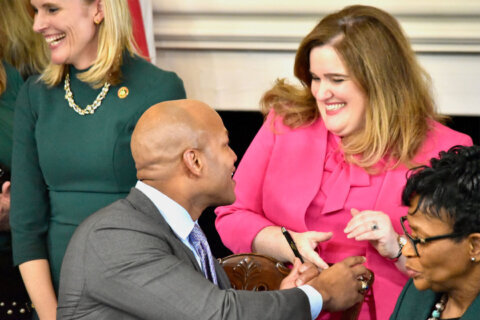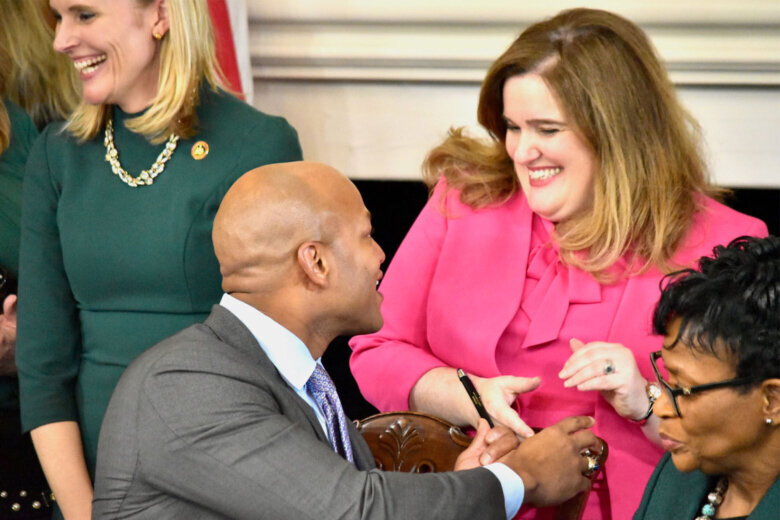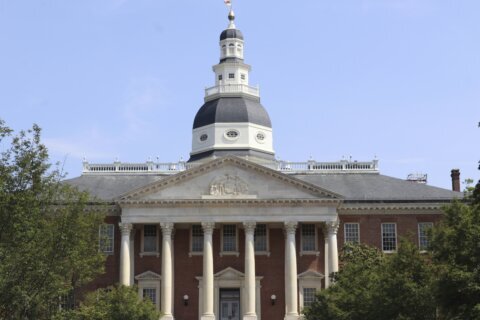This article was republished with permission from WTOP’s news partners at Maryland Matters. Sign up for Maryland Matters’ free email subscription today.

On June 24, 2022, the U.S. Supreme Court struck down federal laws protecting abortion, ending decades of access a month after a leaked draft ruling, published in Politico, foretold what was coming.
“It was awful. It was heartbreaking. I was crushed….it was like a punch to the gut,” said Sen. Ariana Kelly (D-Montgomery), one of Maryland’s leading voices on abortion policy.
Saturday, it will have been one year since U.S. Supreme Court overturned Roe v. Wade. The abortion landscape has shifted with abortion laws left to state legislatures.
But with a Democratic majority in Maryland’s General Assembly and a new Democratic governor in Wes Moore, the overturning of Roe v. Wade provided fuel that bolstered a successful session for reproductive rights and other progressive causes, unlike the reaction in some neighboring states where lawmakers doubled down on abortion restrictions.
“I think the reversal of Roe v. Wade lit a fire under people,” said Sharon Blugis, executive director of a new pro-abortion advocacy group called Reproductive Justice Maryland.
Legislatures in West Virginia, North Carolina and Florida have passed legislation restricting abortion access in the year since the court overturned Roe. As a result, more people are traveling to Maryland from other states to receive abortion care, according to Karen Nelson, President and CEO of Planned Parenthood of Maryland.
“We always saw patients from the bordering states — West Virginia, Pennsylvania, Delaware — always,” she said. “Now we’re seeing 26 different states. And one of the largest, if not the largest, state that is represented outside of the bordering states is Texas,” she said. Texas now has a near total ban on abortions.
But that information is from only one organization that provides abortion services. Statewide data on how many abortions occur in Maryland is not reported.
“We’ve never done reporting in Maryland,” Kelly said. “We’ve never had a reason to do reporting in Maryland…because reporting makes providers and patients uncomfortable.”
Maryland is one of just three states that do not participate in the Centers for Disease Control and Prevention’s Abortion Surveillance data, along with California and New Hampshire. All other states, Washington, D.C. and New York City participate in the surveillance report.
Kelly referred to data from the Guttmacher Institute, which reports that in 2020, before Roe was overturned, there were 30,750 abortions performed in Maryland.
And more patients from outside the state are expected to travel to Maryland as an abortion access point.
To help accommodate out-of-state people seeking abortions and to further protect abortion access for Marylanders, the 2023 General Assembly brought in a slew of abortion protection measures which Moore approved in early May.
House Bill 705 proposes a constitutional amendment and will give voters the opportunity to amend the state constitution to affirm that Marylanders have a “fundamental right to reproductive freedom” on the 2024 ballot. The proposed amendment includes the right to prevent, continue, or end one’s pregnancy.
The bill had been sponsored by House Speaker Adrienne A. Jones (D-Baltimore County) for the past two years, and was co-sponsored this year by Senate President Bill Ferguson (D-Baltimore).
While there were few Republican votes for abortion protections this session, Kelly believes that Maryland voters will vote in favor of protecting abortion access with the constitutional amendment.
“The legislatures tend to be more conservative than the voters are. It’s not just Democrats who are pro-choice in the state of Maryland. A lot of Republicans are as well. You can’t say that about the elected Republicans,” Kelly said.
That said, there are conservative Marylanders may who do not want abortion access to be expanded.
Maryland Right to Life argues that the proposed constitutional amendment is vague and believes it would be used to “suppress pro-life speech and action,” according to Laura Bogley, executive director for the anti-abortion organization.
“In other parts of the country, they’re passing legislation to protect the lives of the pre-born, and they’re saving lives. But in Maryland — it’s extreme in Maryland,” Bogley said.
The proposed constitutional amendment is just one arm of the pro-abortion legislation passed this session.
A first-in-the-nation abortion protection measure approved this session was Senate Bill 341/House Bill 477, which requires public 4-year universities to provide access to over-the-counter contraceptives, emergency contraceptives and referrals for abortion services to students, if needed. Kelly sponsored that bill when she was in the House, along with Del. Stephanie Smith (D- Baltimore). Sen. Brian Feldman (D-Montgomery) sponsored the legislation in the Senate.
Another major pro-abortion bill (Senate Bill 859/House Bill 808) protects the medical privacy of those who seek out an abortion and protects abortion providers from civil and criminal liability from other states, as a response to other states prohibiting abortion access. Del. Nicole Williams (D-Prince George’s) and Del. Terri Hill (D-Howard) sponsored this legislation in the House with Sen. Will Smith (D-Montgomery) sponsoring in the Senate.
The legislation protecting medical providers from liability regarding abortion services is similar to a recent executive order issued by Moore. That order protects medical providers for providing gender affirming care to transgender Marylanders or those from outside Maryland seeking such care.
On the same day that Moore approved the abortion measures, he also signed the Trans Health Equity Act into law, expanding Medicaid coverage for gender-affirming health care “consistent with current clinical standards of care.” That could include hormone therapy and puberty blockers, voice training and therapy, and body alterations that affirm someone’s gender identity. The legislation was sponsored by Sen. Mary Washington (D-Baltimore and Baltimore County) and Del. Anne Kaiser (D-Montgomery).
Blugis, of Reproductive Justice Maryland, said that while legislators have proposed progressive measures in the past, the overturning of Roe may have helped usher in more progressive causes.
“They realized that the GOP was not going to stop. There is no compromise,” she said. “It absolutely lit a fire about what a serious situation we are in…and we need to do everything we can to shore up, to protect people.”
Nelson, with Planned Parenthood of Maryland, says that it doesn’t surprise her that both abortion and transgender health care are being elevated at this time.
“These things go hand-and-hand,” Nelson said, “because you’re talking about being able to make decisions about what you can do about your own body — make your own personal health care decisions.”








